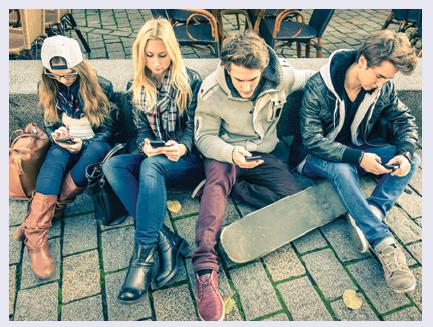Baby boomers who were schooled in the 1960s and went to university in the 1970s would readily
Question:
Baby boomers who were schooled in the 1960s and went to university in the 1970s would readily agree that the technology revolution can be spoken of in the same breath as the industrial revolution. A teenager in the final years of high school in the late 1960s would go to a local church or recreation centre social on a Friday or Saturday night to meet and hopefully dance with members of the opposite sex. He might thereafter use a landline dial phone to ask a girl out on a date. Black‐and‐white TV and a mono radio were the only sources of entertainment in the house, and the idea of a home theatre was inconceivable.
At university, lecturers would debate theories and write the occasional note on a chalkboard. The lecturers spoke so fast that students could not write everything down, so they would go to the library in the evenings and read hard‐copy journals to fill in the missing bits. If they wanted to use a computer, they entered their data cards into mainframes via mechanical card readers.
In the last decade of the 20th century, all this changed. PCs appeared on desks, facilitating widespread use of the internet. Originally accessed on 286 MB PCs, the world wide web was understandably jokingly referred to as the ‘world wide wait’. Simultaneously, brick‐sized mobile phones, which could be serendipitously used to ward off potential muggers, appeared. Like computers, they were soon replaced by much smaller models that could access TV and radio. By 2011, smartphones could access the internet, be used as still and video cameras, and even as a GPS and handheld gaming device (not to mention to access social media sites like Facebook, Twitter and Google+). Nowadays, a range of services can be accessed using relevant apps on smartphones and tablets; for example, a receipt for a visit to the doctor can now be photographed using the phone, uploaded and submitted as a claim to Medicare via its app. These days, students can be seen walking around university campuses interacting with one another over mini screens. When asked for a metaphor to represent his university, one student suggested ‘Apples’. When Steve Jobs died in 2011, United States President Barack Obama referred to him as a visionary who changed the world. Such was the outpouring of tributes to his creative genius at the time of his death that one is driven to wonder whether he will one day be beatified as Saint Steven.
The face of university lecturing has also changed indelibly. Electronic versions of lectures, sometimes even recorded, are placed on learning systems via WebCT, Blackboard and Moodle. This has led to a marked drop in attendance at lectures, with some students now leaving university without ever making a friend.
QUESTION
Should managers allow workers to access social networking sites during their lunch hours? List the pros and cons that may affect this decision.
Step by Step Answer:

Management
ISBN: 9780730329534
6th Asia Pacific Edition
Authors: Schermerhorn, John, Davidson, Paul, Factor, Aharon, Woods, Peter, Simon, Alan, McBarron, Ellen





